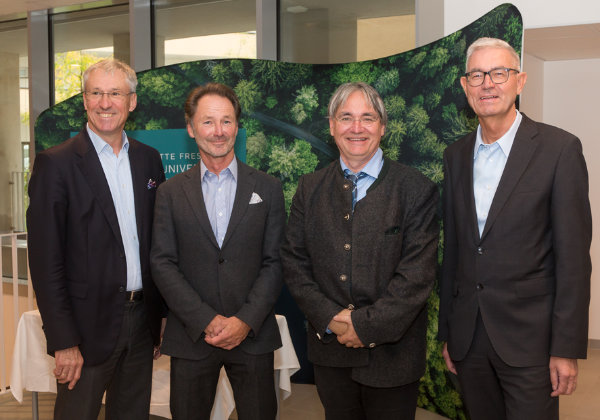| Dejan Filipovitch
| October 23, 2023
Under the slogan “Science Meets Urban Development,” participants and visitors were presented with a platform for sustainable solutions in the field of urban development and corporate management for the future.
As part of the 18th Austrian CSR Days, RespACT Austria, Charlotte Fresenius Private University Vienna (CFPU) and Seestadt Aspern invited people to attend the inaugural event “Science Meets Urban Development”.
“Sustainability is not a choice, but a commitment that we must accept for a future worth living. The common goal of RespACT Austria, Seestadt Aspern and the private Charlotte Fresenius University of Vienna is to develop innovative solutions that not only promote economic success,” says Bernhard Sams, founding chancellor of the Charlotte Fresenius University In Vienna, “the CSR initiative provides an ideal environment for exchange to get significantly closer to this goal.”
Technology and sustainability
Under the slogan “Science Meets Urban Development,” a platform was presented to the attending participants and visitors for sustainable solutions in the field of urban development and corporate management for the future.
The focus was on discussions about the relationship between technology, sustainability and urban living space. The event brought together experts and stakeholders from the worlds of business and politics to highlight key topics in the field of corporate management in the era of artificial intelligence and sustainable urban development. One of the key takeaways from the event was that tomorrow’s innovations must be more attractive than today’s options for people to pursue them.
“We are very pleased that so many experts and interested parties have accepted our invitation,” said Martin Krebb, founding rector of the private Charlotte Fresenius University in Vienna. “This not only shows how important the exchange is, but also underscores the importance of the topic.”
Area as a climate protection programme
After welcoming Bernhard Sams, Peter Geffinger, from respACT Austria, and Gerhard Schuster, Vienna 3420 Aspernt Development, Robert Grunis, Member of the Board of Management of Vienna 3420 Aspernt Development, presented the current situation, future plans and new challenges facing Seestadt in his first keynote speech. development.
“70 to 80 percent of people will live in cities in 2050. This fact is certainly worth thinking about how to design future living and working spaces as sustainably as possible. Seestadt Aspern is a pioneer here – with a total area of 240 square meters hectare “It is not only a project An impressive urban development, but also an important project for climate protection,” says Robert Grunis.
Seestadt Aspern is a model of sustainable urban development due to its resource-efficient construction methods, smart energy solutions, minimal land consumption and innovative stormwater management.
Business Administration and Artificial Intelligence
As part of his keynote address, Philip S. Mueller explores how companies can navigate the complex waters of the digital age, such as digital transformation and emerging artificial intelligence, and at the same time act in an economically and socially sustainable way. The answer to all these challenges, according to the vice president of public sector at Drivelock and an affiliate of the Harvard Berkman Center for Internet and Society, is ingenuity. Skillfully combining technological thinking with social awareness. Most importantly, integrating AI with the ethical and social agenda should enable companies to not only increase their profitability, but also make a positive social impact.
Solutions on the ground
The keynotes were followed by a discussion entitled “Solutions that work” with experts such as Olivier Joly, Aspern Smart City Research, Martin Krebb, Founding President of the Private University of Charlotte Fresenius, Maxime Momerency, EIT Manufacturing, Ralf Pemmeskern, and the German Sustainable Development Association. Building, Martha Maria Wanat, Young Leaders Academy and Andrea Edelmann, respACT Austria.
The conclusion of the round of discussions was that it is necessary above all to create the right framework conditions in order to promote concrete changes. Only when sustainable innovations become more attractive than existing solutions will they be accepted by the majority. In this context, policy is particularly needed. Ultimately, good ideas will eventually fail because implementation is difficult due to the political framework. Overall, finding a solution turns out to be very complex, but economics, politics and society do not have to make any risky decisions in order to ensure a sustainable future.
The expert discussion was followed by an opportunity to network, network and continue discussions.
Many guests
At the invitation of RespACT Austria and the private Charlotte Fresenius University in Vienna, participants included Marita Derringer, Schachinger Logistik Holding, Andrea Edelmann, EVN, Bernhard Gaul, Kurier, Peter Giffinger, Saint-Gobain Austria, Robert Grüneis, Aspern Development, Oliver Juli, Aspern Smart City Research, Maxim L. Mommerency, EIT Manufacturing, Philipp S. Mueller, Drivelock, Thomas Pappenscheller, Federal Ministry of Arts, Culture, Public Service and Sport, Ralf Pimiskern, DGNB German Council for Sustainable Building, Gerhard Schuster, Aspern Development. and Martha Marisa Wanat, Young Leaders Academy.
leadersnet He was at the event. You can get the impression here.

“Certified tv guru. Reader. Professional writer. Avid introvert. Extreme pop culture buff.”







More Stories
Samsung Quantum Dot TV: Art meets technology
Pitch: €56m for energy startup Reverion
Plastoplan: Plastics for Energy Transition